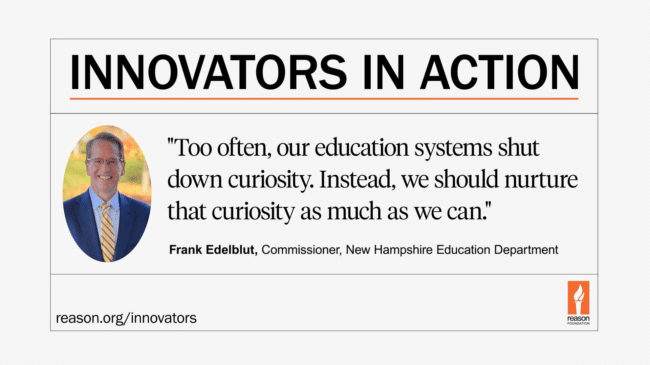New Hampshire’s Learn Everywhere program has broken public school districts’ monopoly on what it means to learn. The innovative program, which passed into law in 2018, allows students to earn high school credit for learning that happens in their communities.
Under the policy, prospective course providers—such as non-profits, museums, and colleges—apply to the State Board of Education for approval. Applications are evaluated based on several factors including provider qualifications, expected outcomes, and student assessment plans. The first program was approved in December 2020 and students can now get academic credit for learning about Marine Biology at East Coast Science Center, participating in First Robotics, taking music lessons at North Main Music Center, and others.
Learn Everywhere is the brainchild of New Hampshire’s Education Commissioner Frank Edelblut, whose background as an entrepreneur and father of seven has helped shape his vision for what public education should look like. Our conversation has been condensed and edited for clarity.
Smith: Give us an overview of Learn Everywhere and how it started. Where did this idea come from and what problem is it addressing?
Edelblut: The impetus was an experience I had visiting one of our high schools. I walked in at 8:30 at night and there were about 25 kids doing really engaging things as part of a First Robotics program. Some of them are programming in Java, getting their robot to navigate various obstacles that they created. Others were working closely with Bosch engineers. They literally had a hacksaw out, building a robot.
“Kids are inherently curious learning machines. What you have to do is try not to squash their curiosity. You have to try and find ways to nurture and encourage it.”
Commissioner Edelblut
This young lady comes up to me and says, “Mister, you’ve got to help us. The school closes at 10:00, and we need to stay open until 11:00.” And so, my first thought is, ding, I win the prize. I’ve got kids begging me to keep school open. But, the second thought I had was, these poor kids are going to go home and they’ve got to do two hours’ worth of homework because all of this learning they’ve been doing for the last five hours doesn’t count for academic credit. And I’m like, well, that’s so silly. They learn more stuff here than they have all day long during school.
Kids are inherently curious learning machines. What you have to do is try not to squash their curiosity. You have to try and find ways to nurture and encourage it. Too often, our education systems shut down curiosity. Instead, we should nurture that curiosity as much as we can. That means that learning is not limited from 7:30 to 2:30. Kids learn all over the place, all the time.
Smith: Walk us through how Learn Everywhere works.
Edelblut: Most of the education reform works on a demand curve, but Learn Everywhere is different. It’s a supply side initiative where we look around and see where kids are already getting together and learning. Rather than building programs that might have little interest, we find ways to make this learning count toward their education.
Smith: Learn Everywhere was signed into law in 2018 and finally got its first program approved by the SBOE in December 2020. What obstacles did it face and what were some of the arguments levied against it?
Edelblut: K-12 education is very resilient to any type of innovation and change, because people who chose it as a vocation like traditional instruction models. That’s why they chose it, so why would they want it to change?
So, once the law passed it was basically a game of chess, and the educational establishment put up a number of obstacles. One of the biggest arguments is that school districts should decide if and when a student has mastered a subject in order to award credit.
But it was very hard for them to make this argument. After all, kids were learning at places like New Hampshire Academy of Science at Dartmouth College, where they’re working with top-end equipment with world-renowned professors. And so, they’re trying to argue and say, “Well, how can you trust a world-renowned physicist to teach these kids physics?” That just doesn’t fly very well.
“So, once the law was passed it was basically a game of chess, and the educational establishment put up a number of obstancles.”
Commissioner Edelblut
But it’s not a zero-sum game. It is an expanding universe that we’ve created. The argument that we came back to time and again was that it needs to be about student learning, not about who did the instruction or where the instruction took place.
Smith: How are Learn Everywhere providers held accountable for student learning?
Edelblut: One might ask the same question of the traditional public education system, how do we know that they’re really held accountable? Usually, that is just a straw man.
We want to make sure that they’re mastering the things that they need. And so, when a Learn Everywhere provider submits an application to the state board of education, they have to describe how they’re going to determine that the kids have actually mastered the competencies. And it’s really interesting, because it actually creates an opportunity for innovation in assessment as well.
Smith: Currently, public education dollars don’t follow the student to cover Learn Everywhere courses. What do they typically cost families and what’s being done to ensure access for all kids?
Edelblut: Our state board is very deliberate about asking applicants, how are you going to meet the needs of all the kids?
For instance, the Boys and Girls Club has a great theater arts program that doesn’t cost anything to participate. Or there’s Friends Forever International, which has a free leadership program that specifically targets kids who are at high risk for dropout. When there are financial barriers, we try to talk to the programs about how to make them more accessible. How are you going to make sure that finances don’t ever become a reason for a kid not to be able to engage?
Smith: Do you see a future where the state’s school finance system funds Learn Everywhere courses?
Edelblut: In some respects, it is already, through our Education Freedom Accounts program. For example, if you’re an EFA student, you can use funds to take math at Kumon Learning Centers. But I think ultimately, this will become integrated into the schools as another tool in the toolbox for kids.
Smith: What challenges does Learn Everywhere currently face?
Edelblut: Right now, there are too many interested parties to get through the approval process. I just got some funding from a nonprofit that is going to work with programs to navigate the process because we have to translate what they’re doing into edu-speak for the state board.
Smith: Are policymakers in other states considering similar programs? What advice do you have for them?
Edelblut: I’ve heard of about twelve other states that are looking at Learn Everywhere programs, and one of the things I think that will help to drive this is some of the national programs that we’ve signed up in New Hampshire. When the Boys and Girls Clubs in Michigan see what we’re doing, they’re going to be like, “Hey, we want to do this in our state.”
This is not a “build it and they will come” program. The one thing I say is be careful not to ruin the magic. For instance, in our conversation with First Robotic, they said, “Well, we’ll go create a curriculum…” I’m like, no, whatever you do, don’t create a curriculum. That will ruin it. Then the kids aren’t going to want to go. You’re doing everything you need to do. Don’t ruin the magic by trying to respond to educators.
And truthfully, for my first couple of approvals through the state board of education, that was a problem. They kept saying, “Well, how do we know? How do we know this, or how do we know that?” It’s because the kids are already there, engaged, and learning. It just doesn’t look like education the way that we think of it in our own heads.
Smith: You often talk about unbundling education. What does this mean and why is it important?
Edelblut: It’s basically about mass customization. Just like everything else in the world, you can have mass customization, but education tends to still be so monolithic and homogenized. The question is, do you trust parents to make decisions? When you choose something, you’ll get bigger agency. When you choose something, you have a vested interest in that. You have agency in that choice, and you want to make sure it’s successful.
More information on New Hampshire’s Learn Everywhere program can be found here: https://www.education.nh.gov/pathways-to-education/learn-everywhere

